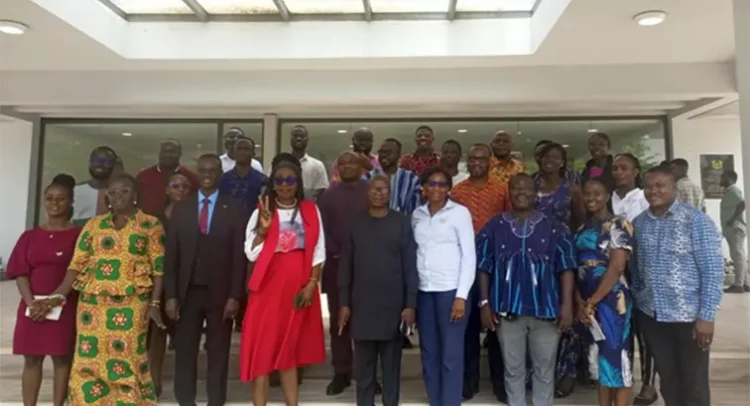Officials at the stakeholder engagement
Minister for Labour, Jobs and Employment, Dr. Abdul-Rashid Hassan Pelpuo, has stated that the country’s quest for economic growth is hindered by the mismatch between the skills of its workforce and the needs of the labor market.
He indicated that as technology continues to reshape industries, the demand for high-skilled workers is on the rise, but a shortage of critical skills and outdated qualifications are holding back productivity and growth.
He made these remarks in a speech read on his behalf by the Acting Chief Director of the Ministry of Labour, Jobs and Employment (MLJE), Gloria Bortele Noi, during the stakeholder engagement meeting on the conduct of Qualifications and Skills Mismatch Survey of Persons in Employment (QSMS).
The sector minister emphasised that the mismatch between qualifications and labour market needs hinders proper placement and utilisation of employees, affecting both formal and informal sectors.
“As demand for tertiary education and skills development grow, it is crucial to ensure these investments translate into meaningful opportunities where talents are fully utilised and valued,” he said.
“As the lead policymaker on employment and labor issues, the Ministry recognizes the need for comprehensive data to address skills mismatches. The QSMS will be Ghana’s first nationally representative survey to measure these gaps, inform policy, and align education with labor market needs, ultimately enhancing productivity,” he noted.
Director of Research, Statistics and Information Management (RSIM), Shadrack Mensah, reiterated that, the primary aim of the survey is to measure qualifications and skills mismatches among employed individuals, generating comprehensive statistics that complement existing measures of labour underutilisation, including unemployment, time-related underemployment, and potential labour costs.
Highlighting the survey’s specific objectives, he stated that the survey seeks to collect and coordinate digital, occupational, educational, and training data to assess the level of skills mismatch across various sectors and regions.
“The survey also intends to use the data to assess the prevalence of skills and qualifications mismatches among diverse demographic groups, including women and men, young people, migrants, persons with disabilities, and other groups of particular policy concern,” he added.
He emphasised that, the survey’s expected outcome is to provide actionable insights into skills mismatches, informing evidence-based policies and interventions that promote better labor market outcomes, improved skills utilization, and reduced underemployment.
He noted that, the survey findings will inform national human capital development policies, enhancing workforce productivity, reducing unemployment, and driving economic growth through evidence-based policy directions.
Call to Action
He thus urged stakeholders, industry leaders, policymakers, and development partners to actively support the successful execution of the survey saying, “your participation in stakeholder engagement, data collection, and implementation of findings is crucial to aligning Ghana’s workforce with emerging labor market trends”.
“Through collaboration and commitment, we can transform Ghana’s labor market into a dynamic and competitive space that maximizes the potential of its workforce,” he said.
Giving an overview of the Pilot QSMS, Wilberforce Nii France, stated that, the Pilot QSMS was conducted in 15 districts across Greater Accra, Northern, and Upper West regions, spanning 25 days. It covered formal and informal establishments, aiming to refine the survey instrument, build field team capacity, and estimate resources for a successful full-scale survey.
The pilot survey according to him, encountered challenges including limited media engagement, institutional skepticism about the survey’s utility, and delays due to requests for authorisation from head offices, resulting in non-participation or delays.
To address concerns and encourage participation, he mentioned that, a public notice was published on the Ministry’s website, and monitors provided clear information about the survey.
He said assurances on data confidentiality and transparency were also given to build trust.
By Janet Odei Amponsah


